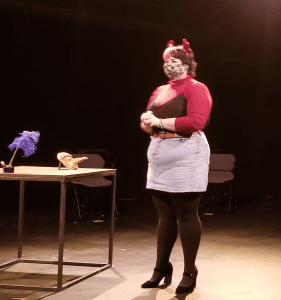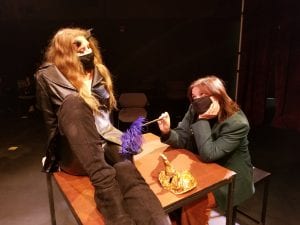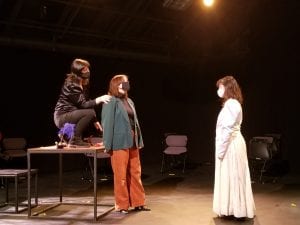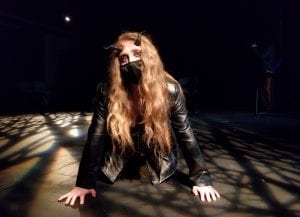Augustana Puts Female Spin on Classic Faustian Tale In New Production
The classic bromance of Faust bargaining with the devil, becomes a feminist, queer bond in a new Augustana College production opening tonight, Oct. 29, at the Brunner Theatre Center’s Blackbox Theatre.
“The Tragical History of Doctor Faustus” by Christopher Marlowe (1564-1593) stars students Lauren Larson as Faustus and Alyssa Frazier as Mephistopheles, directed by senior theater major SophiaRose Brown.

Christopher Marlowe was a contemporary of Shakespeare who died in 1593, at age 29.
Doctor Faustus has mastered every scholarly subject, so what is left to explore? Magic? Necromancy? When offered everything she desires for 24 years and a demon at her command, the temptation is too great to resist. Would you make a deal with the devil?
“Working on a show during a pandemic isn’t the most fun thing to do, but it will force your creative juices to flow, which is pretty rewarding,” Brown said this week. “We had to make a number of sacrifices with the amount of cast members and scene choices, but at the end of the day it’s a wonderful show that I wouldn’t have dreamed working on during any other time.”
The normal “Doctor Faustus” has over 20 actors, but this one has nine (with eight at most on stage at a time), the director said. Brown had to cut characters and at least one scene. Since the script is in the public domain, they could make major changes.
The original Elizabethan language remains (Marlowe and Shakespeare were born the same year), but she switched the genders of Faustus and Mephistopheles, and it’s set in a timeless period, with some modern touches.
“I love Elizabethan theater – I love Shakespeare, Marlowe plays,” Brown said. When she read “Doctor Faustus” in assistant professor Jennifer Popple’s theater class, she fell in love with the play and seeing a Globe production video.
“I decided that in any way, shape or form, I had to have Mephistopheles come to life,” Brown said. “I just love that character. It’s just such a fun, fun play, that is mesmerizing to watch and to work on.”
Mephistopheles has a confidence of being immortal and knowing nothing can ever happen to you, she said.

SophiaRose Brown is an Augustana senior majoring in theater.
“He’s very sure of himself, but also very playful at the same time. He knows how to work people into getting what he wants,” Brown said. “And it also has to do with the language – it’s just so beautiful and gorgeous, the way he manipulates people into doing what he wants them to do by making them think it’s what they want to do.”
“It’s such a fun and challenging role, that I think is very rewarding,” she said.
“When I was reading it, I thought of how wonderful it would be to bring the female perspective to these characters,” Brown (who identifies as bisexual/queer) said. “And have this classic piece, always played by men – who always do a wonderful job – but allowing strong-willed women to play these roles. How amazing and confident it would make these actors.”
Marlowe had many male friends he had romantic relationships with, and the play features a romantic relationship between the two primary characters.
“I wanted to keep the queer theory aspect of this show, and how easy it is to apply it to this show, but bring it over to women,” Brown said. “You hear a lot about male homosexuality, but you never hear anything about the female side of it. Just kind of bringing a light to a female relationship just adds another layer to the whole story.”
“As a queer person, sitting there and seeing how these two interact with each other, the dialogue and the way these two characters interact, it’s very clear that there’s some sort of an attraction there,” she said. “I think to play into that is extremely easy.”
In the Faust story (traced to a fourth-century tale known as “The Devil’s Pact,” Marlowe portrays Faustus as a brilliant scholar who leaves behind the study of logic, medicine, law and divinity to study magic and necromancy, the art of speaking to the dead. When he’s approached

A promotional poster for “Doctor Faustus.”
by a Good and Bad Angel, it’s the Bad Angel who wins his attentions by promising that he will become a great magician, according to synopsis.
By revoking his own baptism, he attracts the attention of Lucifer, Mephistopheles and other devils. Faustus strikes a pact with Lucifer, allowing him 24 years with Mephistopheles as his assistant, but after the pact begins Mephistopheles will not answer Faustus’ questions. Faustus achieves nothing worthwhile with his pact, warns other scholars of his folly, and the play ends with Faustus dragged off to Hell by Mephistopheles.
Like Shakespeare, Marlowe was born in 1564 but is far less famous or well-known, partly because of his mysterious death at age 29, Brown said.
“If Marlowe had lived longer, we’d be studying him just as much as we study Shakespeare,” she said. “If people start reading more Marlowe, they’ll kind of unlock this second life that Elizabethan people led that we might not have known about without his writing.”
Among Brown’s favorite things in the Marlowe, the fools of the Faust story summon Mephistopheles and they don’t know how they did it. In Shakespeare, they would know how to use him to get what they want, she said.
In this story, Mephistopheles and Faustus are on the same side. “Faustus believes he’s this smart, strong person who has learned everything

Alyssa Frazier, left, as Mephistopheles and Lauren Larson as Faustus.
he needs to on this earth, so he decides to take up necromancy and summon a demon servant,” Brown said.
“He thinks he’s the one in charge of Mephistopheles,” she said. “In the end, Mephistopheles is the one who takes his soul to Lucifer, to enlarge Lucifer’s kingdom. Mephistopheles is the one who gets what he wants at the end of the day, because Faustus is too full of himself to realize that he could be doing something that could completely jeopardize himself.
“At the end, Faustus wants to repent, but Mephistopheles has his hands around his throat, figuratively,” Brown said. “He feels he cannot repent for what he’s done.”
A moral of the story is warning not to trust such a powerful person and not give your heart so easily, she said.
“If Faustus had listened to those around him saying, don’t do this, don’t practice necromancy – if he listened to people he should have trusted, the whole story would not have happened,” Brown said, noting it shows how power corrupts (another timeless theme).
Adding women’s voices to old theater is an easy way to modernize the play and make it more relevant to today’s audiences.
“Even just taking these roles and turning them into females, and letting female actors play them is a way to modernize it, because it wouldn’t have happened back then,” Brown said.
From Normal to abnormal times
Brown got involved in theater in high school in Normal, Ill., where she acted and directed a couple one-acts. She directed her first production at Augie her freshman year, the Holocaust-themed “And Then They Came for Me.”
She enjoys both directing and acting, which she called two different challenges.

The play features Meghan Gove, left, Alyssa Frazier and Lauren Clarke.
“Directing, there’s a lot more that goes into it than the acting portion, but I do love and miss acting,” she said. “It’s super satisfying, but there’s definitely a pressure to directing. Theater is a collaborative art; you can never do theater with just one person. It’s a group of people coming together to put a show on.
“As the director, my job isn’t necessarily bigger than anybody else’s, but the director’s job is to take the pieces that everybody has put into the show and make them cohesive,” Brown said. She gives free rein to her cast and crew for what they’d like to do in their roles, making sure it fits the time period and vibe of the show.
“It’s making it one cohesive show, which is the biggest job a director has,” Brown said, noting she’s learned a lot from theater professor Jennifer Popple. “She’s been kind of a guiding light to me throughout this show, making sure I am always doing what I need to, but always reminding me I am doing a good job and I’m doing what I need to do.
“I take a lot of inspiration from how she directs,” Brown said. Augie typically sets aside three times a year for students to direct a studio show, performed in the Brunner Blackbox Theatre.

Brown, left, and Meghan Gove participated in a 2018 Augie production of “The Vagina Monologues.”
She planned to direct another “And Then They Came For Me” this past spring before Covid hit.
For “Doctor Faustus,” all performers and audience members must wear masks at all times, and audience members are six feet apart – meaning the capacity for the theater is 27, compared to a maximum 80 to 100. The school’s guidelines don’t allow off-campus people in campus buildings, so this weekend is only for college students, staff and faculty, and a filmed performance will be streamed online Nov. 7.
“Everything is a blessing in disguise,” Brown said of working around restrictions. “I think the six feet apart seating is interesting, because it isolates each audience member, so they don’t have anybody sitting next to them, and can fully immerse themselves in the show.”
The actors wear cloth masks, after unsuccessfully trying to rehearse with clear face shields.
“We all agreed that it would kind of pull people out of the show, watching them with clear masks,” Brown said. “We did most all of our rehearsals with cloth masks. We worked really expressing the eyes and using your body physically, to express your emotion and your intent. One of the things being a director comes with, you get to watch people make facial expressions, so that’s something you have to work on with your actors.”
She had to work on vocal projection especially with the cloth masks, and space actors out more than usual in blocking.
“One of the most challenging parts of the show is, at the end, Faustus asks Mephistopheles to summon Helen of Troy, because he wants to see her beauty one last time before he’s taken away,” Brown said. In the original play, Helen and Faustus kiss, and in this version, they flash a light to distract from the fact they’re not actually kissing, but it looks like they are.
The cast includes Haley Tromblee, Meghan Gove, Lauren Clarke, Roger Pavey, Titus Jilderda, Emily Keiner and Maxwell Johnson.
The production staff includes Synthia Gonzalez, stage manager; Johann Roman, assistant stage manager; Cassandra Karn, dramaturg; Noah Hill, lighting designer; Roger Pavey, sound designer; Megan Hoppe and Jacqueline Isaacson, costume designers; Trinity Filut, props master; Eli Bates, board operator; Eli Bates and Miles Potje, backstage crew; Lauren Palmer, house manager; and Michael Tarchala, poster designer.

Alyssa Frazier as Mephistopheles in “Doctor Faustus.”
“The Tragical History of Doctor Faustus” will be performed live Oct. 29-Nov. 1 at the Brunner Theatre Center, 3750 7th Ave., Rock Island. Shows will begin at 7:30 p.m. Thursday, Friday and Saturday, and at 1:30 p.m. Sunday.
Tickets are pay-what-you-can tax-deductible donations (you can reserve for free as well). Proceeds will be split with Argrow’s House of Healing and Hope, a Davenport organization that provides free services to female survivors of domestic abuse or sexual violence.
Brown said the Augie theater fraternity has donated and volunteered there in the past.
“We thought it would be a perfect time to open up donations going to Argrow’s House,” she said. “It’s a place for women to find solace if they’re facing any sort of abuse at home. It’s a very important establishment to have anywhere.”
The recorded virtual performance (done by Augustana-based Fresh Films) will be offered at 7:30 p.m. Nov. 7. Those viewing online will receive a Zoom link after registering for tickets.
A similar theater set-up will take place in November, as “The Curious Incident of the Dog in the Night-Time,” directed by Jeff Coussens, will be performed Nov. 12 to 15 at the Brunner main stage. Just as “The Tragical History of Doctor Faustus,” only current students and employees may attend. The performance will be filmed and available for a viewing on Dec. 4 and 5 at 7:30 p.m.
Winner of the Olivier Award and Tony Award for Best Play, “The Curious Incident of the Dog in the Night-Time” brings Mark Haddon’s international best-selling novel to life on stage in an adaptation by two-time Olivier Award winner Simon Stephens.
Fifteen-year-old Christopher has an extraordinary brain — exceptional at math, while ill-equipped to interpret everyday life. He has never ventured alone beyond the end of his road, he detests being touched and he distrusts strangers. When he falls under suspicion for killing his neighbor’s dog, it takes him on a journey that upturns his world.
Tickets for both the live and virtual performances may be reserved at www.augustana.edu/tickets.









